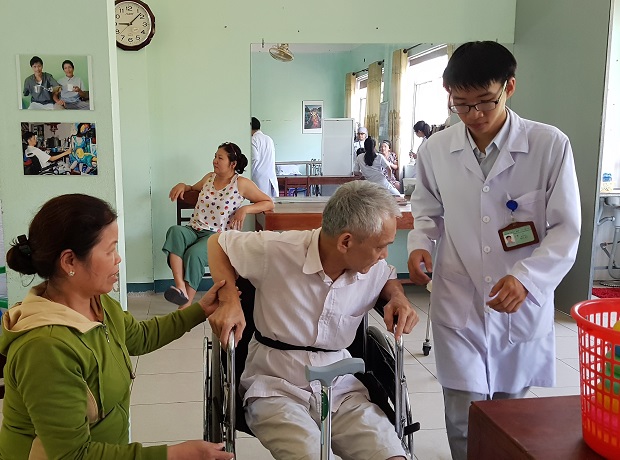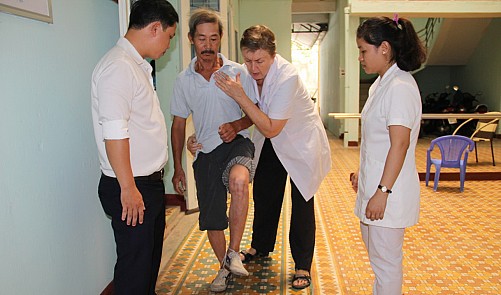Helping stroke patients re-integrate into community
Stroke can sometimes cause severe and lasting disabilities, including partial or complete paralysis, hemiparesis, or one-sided weakness, and brain damage. These can lead to loss of independence, and the need for long-term care either at home or at medical establishments.
 |
| A growing number stroke patients being treated at the Traditional Medicine Hospital |
It is the fact that, despite the high casualty rate, stroke survivors can recover partially or even fully from the disease, and return to normal life if their health problem is detected early, and treated properly and in time.
With over 40 years of experience, US physiotherapist Virginia Lockett, in her mid sixties, has given up her home and career in her homeland to realise her big dream of helping stroke patients in Viet Nam.
What is the most extraordinary about this woman is that she considered saving patients’ lives the meaning of her life.
First arriving in Viet Nam in 1995, her first reason for coming was to adopt a child with her husband.
Ten years later, she went back to Viet Nam as a volunteer of Health Volunteers Overseas (HVO), a Washington DC-based non-profit dedicated to improving the availability and quality of healthcare in resource-scarce countries.
In 2010, Mrs Lockett and her husband decided to settle down in Da Nang which the couple regards as their second home and want to stay here for the rest of their lives.
At that time, she started working as an enthusiastic volunteer at the Traditional Medicine Hospital in a bid to provide professional support for stroke patients.
She is one of the founders of Steady Footsteps, a non-profit organisation that aims to help Vietnamese handicapped people.
Lockett has brought new life to the physiotherapy unit at the Traditional Medicine Hospital since she started working there as a volunteer.
The past 8 years have seen a growing number of patients from Da Nang and other localities nationwide seeking physiotherapeutic treatment at this hospital.
After strokes, patients often have physical defects such as impaired walking. Based on the patient’s disability, Ms Lockett assists them to practice such everyday movements as walking with a pair of sandals on. She also helps them walk correctly. Gradually, their normal activities are rehabilitated. In addition, she also teaches patient’s families some practical physical exercises, so that they can help the patients practice and recover at home.
 |
| Mrs Lockett helping a patient exercise at the Traditional Medicine Hospital |
A 60-year-old male patient from Quang Nam Province’s Thang Binh District is being treated for limb plasticity at the hospital. With the help of the American volunteer, the patient has shown some signs of recovery.
The kind-hearted US physiotherapist always gives her patients trust and hope through her eyes and gestures.
With her great heart, strong dedication, extraordinary generosity, and an unconditional willingness, Mrs Lockett has done her utmost for the benefit of the patients. She always feels very delighted to see her patients recover well and re-integrate into the community.
Currently, a daily average volume of up to 90 patients is treated at the hospital, and they access various treatment methods, including electrotherapy, mechanical spinal decompression and electromagnetic therapy.
Another medical establishment, the Da Nang General Hospital, has gained outstanding achievements in applying advanced techniques and methods in stroke treatment.
In July 2012, the hospital started running inpatient treatment service which is acknowledged as a good way in reducing disability after strokes.
Each day, the hospital receives bewween 50 and 60 inpatients.
Notably, doctor Le Van Son, the Deputy Head of the Rehabilitation Ward and a group of technicians at the hospital jointly created lateral tilting beds which are very useful for stroke patients.
The first ‘made in Da Nang’ medical product helps the patients avoid serious health complications of prolonged bed rest and immobilization.